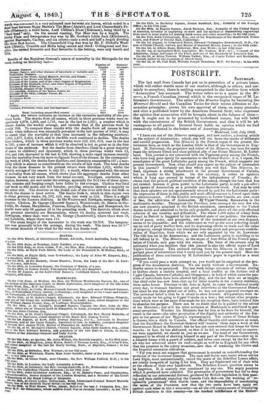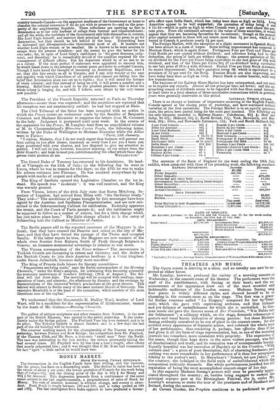POSTSCRIPT.
SATURDAY.
The last mail from Canada has put us in possession of a private letter, which will rather startle some of our readers, although to others, and cer- tainly to ourselves, there is nothing unexpected in the familiar form which "Annexation " has assumed. The writer refers us to a paper in the
Mi- nerve, a French Canadian journal which is the recognized organ of M. La- fontaine's Government. The editor of the Minerve begins by bantering the Montreal Herald and the Canadian Tories for their recent adhesion to An- nexation principles; avows his own approval of them, on many grounds; and cites a published letter by the American General Scott, who expresses the opinion that annexation will be brought about in the fulness of time- that it ought not to be promoted by underhand means, but will befall with the concurrence of the British Government, and that it will be ad- vantageous to all parties. General Scott holds an opinion which wo find extensively reflected in the better sort of American journals.
" Montreal, 15th July 1849. " I have cut out of the Minerve newspaper, and now enclose, a leading article on the subject of Annexation; which, you will see, bears the marks of deliberate and careful preparation. The Minerve is the French organ of the present Go- vernment here, as much as the London Globe is that of the Government in Eng- land. M. Davernay, the proprietor and editor of the Minerve, has been for many years the intimate friend and close political ally of our Prime Minister, M. Lafon- taine. This journal is not connected with the Papineau party among the French, who have long gone openly for annexation to the United States: it is, I repeat, the mouthpiece of the great Lafontaine party among the French, which supports our present Government. Now, what should you expect on the subject of annexation. in this journal? Certainly not that which you will find. he Minerve, in- deed, expresses a strong attachment to the present Government of Canada, but no loyalty to the Empire. On the contrary, it refers to opinions which it long ago avowed in favour of the independence of Canada ; de- clares that the present political condition of the colony, though the best that has yet existed, because it gives power to the Lafontaine party, is only a pia-oiler; and speaks of Anuexation as a probable and desirable event. You may be sure that such opinions are not spontaneously uttered by,and for the Lafontaine party: the expression of them in this public and semi-official manner is.forced upon them by circumstances. All the English newspapersin Lower Can4da are now, more or less, tfaeadvittlites of' Annexation. thiper-eatiada; --Annexation is the fashionable doctfine Throughout the Prost ce, even amongst the very few who are now sincerely attached to the British connexion, annexation to the United States is felt and admitted to be the only probable, and above all the only effectual solution ..of our troubles and difficulties. The whole 1,500 miles of colony from Gaspe to Detroit is beggared by the disturbed state of our politics: the restora- tion of peace, order, and prosperity, out of the materials at our own disposal, seems to be impossible; and the commonest as well es the most reflecting minds see no end of party warfare here, and its depressing effects on trade and the value of property, except through our absorption Into the great and prosperous confede- ration of Republics, from which we are only separated by the St. Lawrence. The tide has set in for Annexation; and the Lafontaine party is unwilling to be left behind by it. The Minerva' as the organ of four-fifths of the French popu- lation of Canada, only goes with the stream. The force of the stream may be estimated when yen recollect that this journal is also the official organ of Lord Elgia's Government. This enclosed cutting from the Minerva is the most im- portant piece of information that I could send you by the present mail. Here the publication of these sentiments by M. Lafontaine's paper is regarded as a most pregnant fact. If you could pass a week amongst us, you would not be surprised at the pro- gress of the Annexation doctrine. We are really without a Government. Au- thority seems to be paralyzed. The last week brings accounts of serious rioting at Quebec about a cholera hospital, and a fatal conflict at the further end of Upper Canada, between Catholics and Orangemen; in both of which cases the pas- sions of individuals have been allowed full play, and the law been set at nought. Our chief ruler has now been shut up for three months in his country residence„ three miles hence. Previous to the riots in April, he came into Montreal nearly every day, to transact business and grant interviews at the Government House; but since he was then pelted out of town, he has not once appeared amongst us. The universal belief is that he is afraid to show himself. .Preparations were re- cently made for his going to Upper Canada on a tour; but certain other prepara- tions which were at the same time made for his reception there, have induced Mtn Mabandon his purpose. There can be no doubt that he is guided by the advice of his Ministers; bat still his utter seclusion at Monklands is attributed to per- sonal cowardice. Whether his Ministers fear for him or he fears for himself, the result is the same-the utter prostration of the dignity and authority of the Em- pire in the person of her Majesty's representative. lChe crown of Great Britain Is thrown into a ditch in Canada. Our official Gazette still announces as usual, that his Excellency the Governor-General will 'receive' three days a week at the Government House in Montreal; but he has not once entered that house for three months: in fact, he has abdicated, so that if he left us tomorrow and no succes- sor were appointed, we should be just as we are. The head of our Government, supposed to be afraid of showing himself in any part of the Province-shut up in a country-house with a guard of soldiers, and never seen except by the few offici- als who are admitted under its roof-might as well be in England for any effect that his presence in the colony occasions, have that of rendering the Crown and the Imperial connexion ridiculous. " For you must not suppose that government is carried on notwithstanding the seclusion of the Governor-General. The rash ''and feeble men under whose advice Lord Elgin, most unintentionally, raised the storm of the Rebellion Losses affair, are totally incapable of laying it for him. They are frightened out of their wits at the effects of their own handiwork. The Rebellion Losses question seems to be forgotten. It is scarcely ever mentioned by any one. The angry passions which it. produced have subsided: The prostration of government has led to deep reflection on our commercial distress, produced by British legislation in first pass- ing and then suddenly repealing the Canada Corn Act-on the working of re- sponsible government' with hostile races, and the impossibility of maintaining the union of the Provinces now that the two races have been again set against each other in bitter animosity-on all the evil oensequences of blundering British dominion in this country-on the intuited ifidiffereace of the Mother- country towards Canada—on the apparent readiness of the Government at home to abandon the colonial connexion if we do not wish to preserve it—and on the pros- perity of the neighbouring Republic. These reflections are carrying us fast to Annexation as to our only harbour of refuge from turmoil and impoverishment: and all the while, the members of the Government only hide themselves in corners, like Lord Elgin himself, and instruct their principal organ of the press to go for Annexation, lest they should be left behind in the race. Everything here is dislocated and disorganized—the Government most of all. It matters not whether Lord Elgin remain or be recalled. He is known to be most anxious to escape from his present thraldom: and the sooner he goes the better for his own sake; for, in spite of Lord Grey's confidence in ' his great firmness, judg- ment, and discretion,' he is remarkably devoid of the qualities required for the management of difficult affairs. But his departure would be of no use to us as a colony. If the most perfect of statesmen were appointed to succeed him, he would break down in the attempt to restore peace and order to colonial Canada. Though I have bated the thought of becoming an American Republican, sure I am that this fate awaits us all in Canada; and I can only wonder at the ease and rapidity with which Canadians of all parties and classes are falling into the belief that Annexation alone can set us to rights ; that it will mend the fortune of every colonist; and that instead of being an evil, it will prove a comfort and a blessing. Relief from pain is said to be the greatest pleasure: this is what the whole colony is longing for, and will, I believe, soon obtain by the only means now possible."



























 Previous page
Previous page